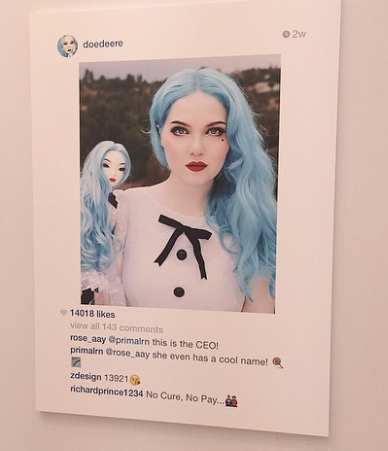Few art law cases have received as much attention as that of Richard Prince and his dispute with Patrick Cariou over the latter’s Yes, Rasta photographs that Prince altered, defaced, and otherwise rearranged for his Canal Zone series. Prince has now garnered renewed attention for his appropriation of Instagram images in a set of works he has been selling at a Gagosian Gallery show called “New Portraits" (and in various other venues over the last few months). He escaped liability for infringement of Cariou’s pictures (though the case settled after remand; several infringement claims were still in play when the parties settled). Can he do so again? If this recent effort is not infringement, it certainly begs the question of whether the fair use exception has swallowed the rule. Lastly, Instagram itself may have prohibited the entire exercise in its terms of use, a possible avenue to short-circuit the entire copyright exercise.
Fair Use Fool me Twice, Shame on Me—Richard Prince Goes Trolling on Instagram But May Have a More Pedestrian Problem
Topics: Richard Prince, Copyright Act, DoeDeere, 2LiveCrew, Prince v. Cariou, Roy Orbison, Canal Zone, Patrick Cariou, Internet, Yes Rasta, 17 U.S.C. § 107, Instagram, Copyright, Gagosian Gallery, transformativeness, Fair Use, § 107
Authentication Lawsuit Against Keith Haring Foundation is Dismissed
The lawsuit arising out of the Keith Haring Foundation’s refusal to authenticate a painting a Haring work, and the Foundation’s related efforts to prevent the exhibition of works it did not consider to be authentic, has been dismissed. The case is the latest in a series of civil cases related to the authentication of art—contemporary art in particular. While this case is resolved pending any appeal, the high-stakes nature of contemporary art assures that it will not be the last.
Topics: authentication, Keith Haring, Sherman Act, Keith Haring Foundation, Gagosian Gallery, Lanham Act, Sotheby's, MIami
Cariou Files Appeals Brief—Is this Case Less Transformative Than It Seemed?
Patrick Cariou has filed his much-anticipated responsive brief in the Richard Prince/Gagosian Gallery copyright infringement appeal. Cariou’s brief makes its stand on the question of transformative use. The degree to which a derivative work is transformative of a protected work is, of course, a central element of a fair use analysis about which Prince will have to persuade the Second Circuit to overturn the judgment below. In so doing, however, one starts to wonder if this case will be of less precedential value—less transformative, if you will—than it has seemed since the judgment last year.
Topics: Richard Prince, Infringement, Second Circuit, Canal Zone, Patrick Cariou, Yes Rasta, Copyright, Gagosian Gallery
Prince Copyright Appeal: Warhol Foundation Makes the Case to Reverse Infringement Finding
After several months of inactivity, the first brief is available in the Richard Prince appeal of the judgment against him and the Gagosian Gallery earlier this year for infringing on the works of Patrick Cariou. Prince’s arguments of “fair use” of Cariou’s photographs failed to persuade the District Court and the infringing works were ordered impounded, a harsh and unusual remedy.
Topics: Richard Prince, Canal Zone, Patrick Cariou, Dada, Association of Art Museum Directors, Copyright, Gagosian Gallery, Fair Use, Andy Warhol Foundation for the Visual Arts
Richard Prince Copyright Appeal Survives Cariou Motion to Dismiss
The Richard Prince copyright case is in the news again, though probably more than it deserves. Patrick Cariou, whose photographs Prince was found this spring to have infringed, moved to dismiss Prince’s appeal arguing that the injunction concerning the impoundment and destruction of the existing works (Prince was ordered to deliver them for destruction) was mooted by a stipulation between the parties. Thus, Cariou argued, there was nothing at the moment to appeal (i.e. Prince appealed to soon).
Topics: Richard Prince, Canal Zone, Patrick Cariou, Copyright, Gagosian Gallery, Fair Use



